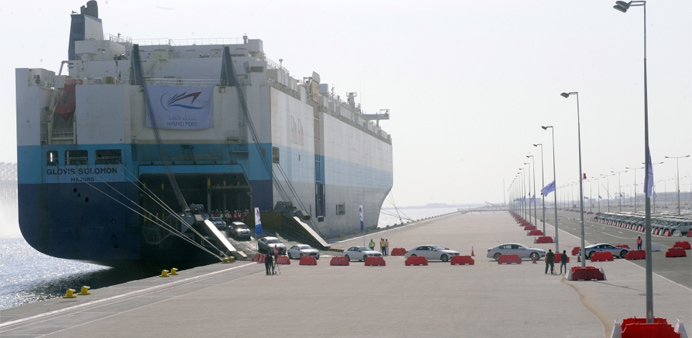Doha
The Hamad Port, one of the largest multi-purpose ports in the region, started partial operations, marking a major milestone for the mega project that will modernise the way Qatar handles ocean imports and exports and help facilitate the growth and diversification of the country's economy.
HE Sheikh Abdullah bin Nasser bin Khalifa al-Thani, Prime Minister and Minister of Interior and a number of other ministers were present at the port to witness the landmark achievement.
“In February, Hamad Port was officially named and we commenced flooding of the port basin. In July, we received our first ship delivering cranes for the project, and today (December 24), its early partial operation will start,” HE the Minister of Transport Jassim Seif Ahmed al-Sulaiti said. He is also head of the steering committee of the Hamad Port project.
Hamad Port opened its general cargo and "roll-on roll-off" facilities yesterday and cleared its operations for the delivery of general goods, vehicle imports and construction equipment.
The start of Hamad Port’s partial operations will increase the container capacity at Doha Port while preparing to receive the world’s largest cargo ships in 2016, according to al-Sulaiti.
“This is another moment of gratitude from the Qatari people to HH the Emir Sheikh Tamim Bin Hamad al-Thani and HH the Father Emir Sheikh Hamad Bin Khalifa al-Thani, and HH the Deputy Emir Sheikh Abdullah bin Hamad al-Thani for their unlimited support and for the success of all giant development projects in the state,” he said, adding that the event marks another significant milestone for Qatar coinciding with the National Day.
Hamad Port is an important addition to Qatar Ports and will handle 6mn containers a year once fully operational.
Al-Sulaiti said the port has a general cargo terminal that can handle 1.7mn tonnes of general goods, 1mn tonnes of foodgrains and 500,000 vehicles. It will also have a livestock terminal, a multi-use terminal, an offshore supply base, a coast guard facility, and a port marine unit.
The new port will provide transshipment links by rail, sea or road to GCC and other Arabian Gulf states. It will have an advanced safety and security system, and a dedicated customs inspection area with latest technologies to speed the clearance of goods.
The establishment of an economic zone adjacent to the new port will facilitate manufacturing industries and help the nation to increase its non-oil and gas exports, al-Sulaiti added.
He said the creation of an integrated logistics park within the port area will provide connection to Qatar and GCC Rail Freight network.
Along with the new expressway interchanges, the port will facilitate cost-effective cargo handling and will position Qatar as the new regional shipping hub, the Minister stressed.

